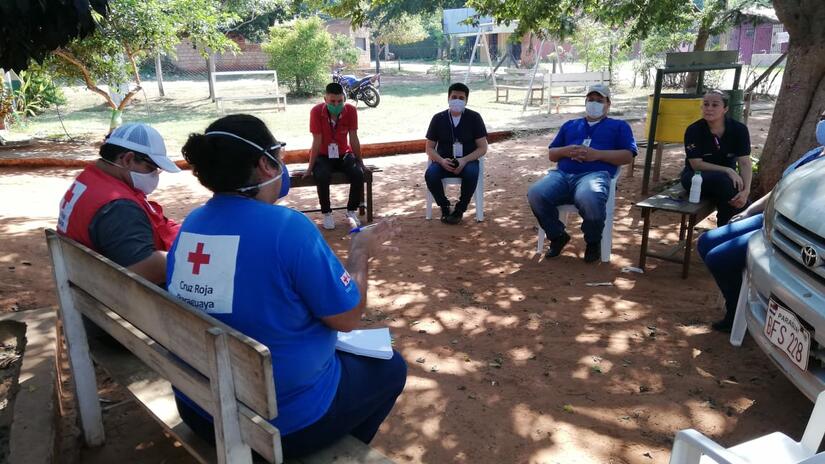By Fernando Gandarillas.
Paraguay has the third highest incidence of dengue fever in the region. This is the third year in a row where there has been an intense outbreak of the disease. In 2020, the country has had the highest number of cases in its history (over 220,000 cases) and 73 people have died. The cities most affected are Asunción, Mariano, Limpio and Capiatá. The Paraguayan Red Cross has been working since the beginning of the year to support to the emergency in these locations; with the support of the IFRC they implemented dengue response projects reaching 1,280 families. The actions focused on generating educational activities for prevention, hygiene and sanitation, as well as the delivery of protection and hygiene kits. These activities suffered serious complications for their implementation with the appearance of the COVID-19 in the country.
The COVID-19 pandemic has complicated the dengue work.
"Due to mobility restrictions and social distancing measures, we were unable to continue with the activities we were carrying out in the communities," said Magali Paredes, Health Officer for Dengue and COVID-19 of the Paraguayan Red Cross.
Much of the work with the community was done through community meetings, where workshops were used to share information. One of the most important tasks was the creation of community brigades to work on the prevention and response to dengue outbreaks at the local level.
Some of the families living in affected areas work in garbage recycling. Many of the recycled items are stored by people in their backyards or in places close to where they live. This is where rainwater collects and where mosquito breeding takes place. Because of this direct link to people's ability to have income, the Red Cross projects were aimed at informing and training community members on how to prevent the spread of mosquito larvae without affecting economic activity.
"We felt that there was always an important involvement and interest from community members because they knew that we are aware of this and that we want to work with them to find solutions," said Magali.
Another piece of the work that the Paraguayan Red Cross has been doing focused on 12 schools in these cities. They work with children to teach them about dengue prevention measures. But, when the isolation measures were adopted, the children stopped going to school. Due to these circumstances the Red Cross is working to generate a process of training teachers.
The Red Cross included a COVID-19 component in community actions since the outbreak of the virus. The creation of community brigades has been key to disseminating information and promoting prevention actions for both dengue and the new coronavirus. In addition, community surveillance mechanisms were created that involve coordinated work between community members and the local Family Health Unit (local public health care point) so that people can report, without fear of being discriminated against, if they have been in contact with people who have tested positive for COVID-19 or if they have been seriously exposed to the virus.
"Many times people do not want to report their health condition, if they are showing symptoms or if they have been in contact with people with COVID-19 because they feel observed," said Magali.
The Red Cross has worked as an intermediary between the community and this state entity to facilitate conditions that create security for informants.
The National Society is working to share information around COVID-19 and dengue fever at the same time.
The work carried out by the Paraguayan Red Cross has been sustained with the active participation of dozens of volunteers. One of the most important results of the project has been to achieve empowerment of the people in the affected communities.
Article
Dengue fever another blow for the Pacific Islands
Dengue fever another blow for the Pacific Islands
| Article

